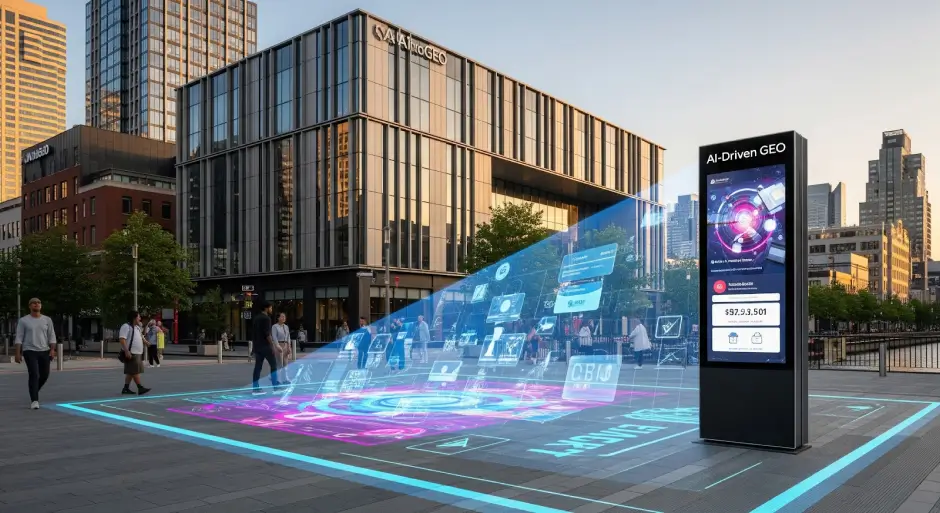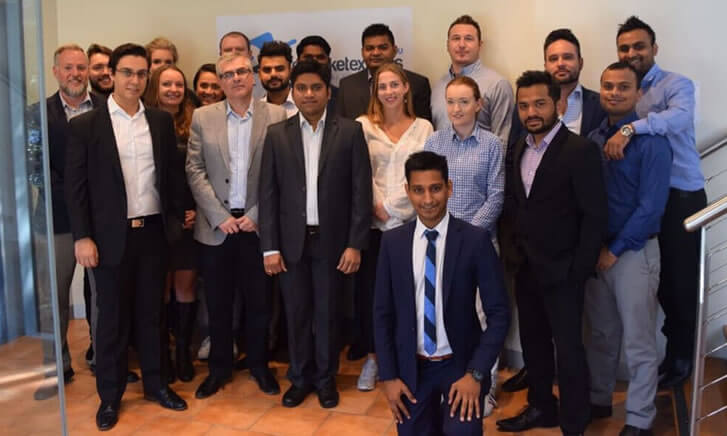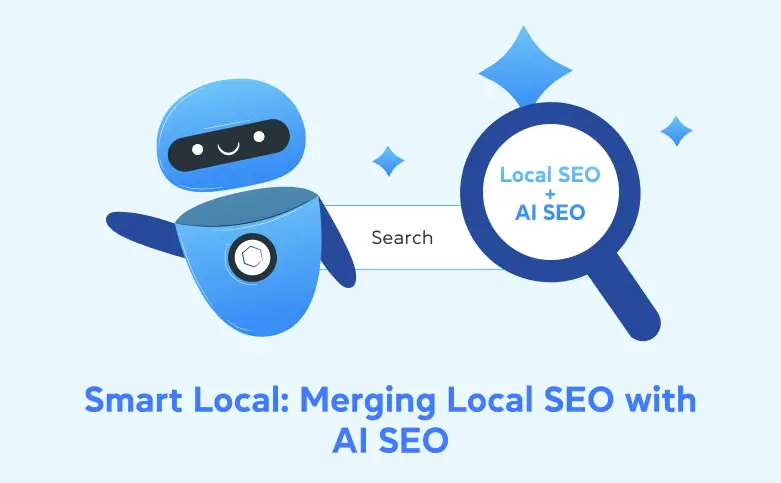Smart Local: Merging Local SEO with AI SEO
How AI-Driven GEO Elevates Brick-and-Mortar Visibility
A few weeks ago, a popular café in Melbourne’s CBD came to us with a puzzling problem. They still ranked #1 on Google for “best coffee Melbourne” and “latte near me,” but foot traffic and online orders had dropped sharply.

At first glance, nothing seemed wrong. Rankings were intact. Competitors weren’t spending heavily on ads. Reviews were glowing. So why were fewer customers walking through the door?
We dug deeper.
Turns out, a competitor café — not even on the first results page — was suddenly featured in AI-generated overviews (formerly SGE, Search Generative Experience).
This client wasn’t showing up in those AI answers at all. Despite stronger content and authority, their site wasn’t structured in a way that AI could “read” or summarize easily.
This wasn’t a traditional SEO issue. This was a textbook case of GEO: Generative Engine Optimisation.
What Is Google AI Mode (and Why It Matters for Local Businesses)
Google didn’t stop at generative summaries and rolled out a dedicated AI Mode in June 2025. Now live as a separate tab across most of the world including the US, UK, India, and Australia, the AI mode is transforming search yet again.
Unlike classic results that list links, AI Mode generates direct answers powered by Gemini, along with an Agent mode that can potentially eliminate the need to visit websites altogether.
Here’s what it means:
- The AI breaks down complex queries into parts.
- It searches multiple sources including GBPs (Google Business Profiles), business websites, review sites and more.
- It generates a summary answer with citations, directions, and business recommendations.
For a café in Melbourne, this could mean showing up directly in an AI-generated summary for:
- “Best coffee near Flinders Street Station with vegan milk options.”
- “Where can I grab a latte in Melbourne CBD before 8 am?”
You got that right. Many of your customers don’t type their queries. They talk to the search engine. And with the AI Mode, they can listen to the AI generated detailed answers and even book a table or an appointment using the Agent mode.
In short, if your site isn’t structured to deliver those quick, parseable answers that Generative AI likes, you risk being left out—even if you rank first organically.
The Latest Trends You Can’t Ignore
Recent data shows just how rapidly this shift is happening:
- AI Overviews are now seen by 2 billion users every month, up from 1.5 billion earlier this year (TechCrunch).
- AI Mode itself already has 100 million monthly active users in the U.S. and India—two of Google’s biggest markets—and the rollout is accelerating globally (TechCrunch).
- According to a Digital Third Coast survey, 58% of users say they regularly rely on AI Mode, and nearly 90% find AI Overviews helpful. But here’s the catch—68% still fact-check the AI answers, meaning credibility and clear sourcing are vital (Digital Third Coast).
- Google itself frames AI Mode as “agentic and personalized,” designed to not just summarize but to take action—from planning trips to booking reservations (Google Blog).
Why This Matters for Local Businesses
As of now, your customers are free to use AI mode, and most of them like to use it. For local cafés, gyms, restaurants, plumbers—any brick-and-mortar—the implications are massive:
- Being #1 in search isn’t enough anymore. If you’re not part of the AI-generated answer, you’re invisible.
- AI Mode amplifies structured content. Businesses with well-formed FAQs, schema, and trust signals (reviews, certifications, media mentions) have a higher chance of being included.
- Search behavior is becoming more conversational. Instead of typing “Melbourne coffee,” users ask, “Where can I get a flat white near Melbourne Central that’s open late?”
Put simply, AI Mode has become the new entry point for how people discover local businesses.
GEO vs Local SEO: What’s New, What Still Matters
What Stays the Same
You still need:
- A well-optimized Google Business Profile (GBP).
- Accurate NAP (Name, Address, Phone) across directories.
- Positive reviews on platforms like Zomato, Yelp, and Google.
- Pages targeting local keywords (e.g., “coffee in Melbourne CBD”).
These are essential for traditional local SEO rankings and the Google Map Pack.
What GEO Adds
But for inclusion in AI summaries, you must also:
- Add FAQ schema, especially conversational ones like “Do you offer dairy-free options?”
- Use LocalBusiness schema across all service pages.
- Write short, structured snippets that AI can easily summarize.
- Highlight trust signals like awards, review scores, and industry mentions.
It’s about making your business AI SEO friendly, not just search-engine friendly.
Real Examples: Australian Businesses in AI Overviews
1. Brisbane Cafe with Vegan Options
A café in West End optimized its menu page with schema and FAQs like “Do you offer gluten-free pastries?” Soon after, it started showing up in AI Overviews for “vegan-friendly cafés Brisbane.”
2. Sydney Fitness Studio
By adding snippet-style answers like “How quickly can I book a casual class?” on their site, they were featured in AI responses for “Pilates studio Sydney CBD with drop-in classes.”
3. Perth Cleaning Services
A local eco-cleaning company added a structured FAQ section (“Are your products safe for pets?”). Result: featured in AI Overviews for “eco cleaning services Perth.”
The pattern is clear: they didn’t just rely on rankings — they optimized for AI readability and inclusion.
Your Easy GEO + Local SEO Checklist
Think of this as a “to-do list” to help your café, gym, salon, or local service show up when people (and Google’s AI) are looking for you.
- Get Your Listings Right
- Make sure you claim and update your Google Business Profile (this is what shows up on Google Maps).
- Add your business to Apple Maps and Bing Places.
- Don’t forget local directories like TrueLocal, Yelp, Zomato—customers and search engines both look there.
- Tune Up Your Website Basics
- Use clear titles like “Melbourne CBD Coffee | Specialty Café” so Google knows exactly what you offer and where.
- Add suburb or city names in your photo captions/alt text—e.g. “Latte art at our Melbourne café.”
- Keep Content Simple & Clear
- Write in short sections (2–3 sentences).
- Use bullet points for key info like your menu, opening hours, or services. This makes it easier for Google’s AI to grab and show.
- Add “Behind-the-Scenes Labels” (Schema)
Schema is just code that tells Google what your site content means. Ask your web person to add:
- LocalBusiness schema (says you’re a local business)
- FAQ schema (marks your Q&As so AI can pull them)
- Review snippets (so your star ratings can show up)
- Show You’re Trustworthy
- Highlight any awards (“Top 10 Melbourne Cafés” lists).
- Keep your Google Reviews high (and reply to them).
- If you’ve been mentioned in local news or blogs, feature that on your site.
- Make It AI-Friendly
- Add conversational FAQs like: “Do you have vegan milk options?” or “Are you open on public holidays?”
- Write short, direct answers to common customer questions.
- Try tools like Wix AI Visibility to see if your business is being included in Google’s AI results.
Final Word: Don’t Just Rank. Be Included.
The search world has changed.
Google’s AI Mode doesn’t just deliver links. It delivers answers. If your business is structured correctly, you become the answer.
That’s what Generative Engine Optimisation is about. It’s not replacing SEO. It’s upgrading it for the age of AI.
So if you run a café, a restaurant, or any local service in Australia, the question isn’t whether you rank — it’s whether you’re included in the AI answers your customers now rely on.
And the time to act is now.








